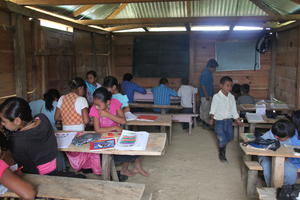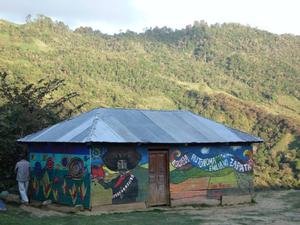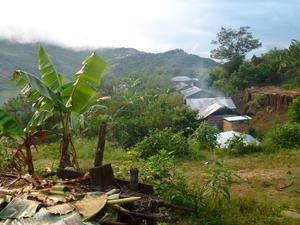Human rights organizations and solidarity activists warn that the Tzeltales of San Marcos Avilés are at risk of a displacement equivalent to that of 2010.
By Dorset Chiapas Solidarity Group
For the Zapatista support bases of San Marcos Avilés, the nightmare of displacement has no end. After the end of the international campaign which had prevented the evictions, the government and the political parties renewed the threat, and there are now fears of an imminent displacement.
The ejido San Marcos Avilés is located in a mountainous region of the official municipality of Chilón, in the Highland region in the north of Chiapas. The population of around 140 families of indigenous Tzeltales grows maize, beans, coffee, sugar cane, and bananas, and keep a few cattle, horses, pigs, and chickens. Within the community live families of Zapatista bases of support (BAZ) alongside supporters of the Mexican political parties of the Institutional Revolutionary Party (PRI), the Party of the Democratic Revolution (PRD), and the Green Party of Mexico (PVEM).
On the morning of Saturday February 23, 2013 came the news those in solidarity with the Zapatistas throughout the world had feared to hear again: “Urgent: Imminent risk of forced displacement of the support bases of the Zapatista Army of National Liberation in the San Marcos Avilés ejido.” This article will try to give the background to the nightmare situation which has been endured by the BAZ of this community since 2010 and show the difference that international solidarity can make at a time of a resurgence of the Zapatista movement.
The eviction
In August 2010, as part of the Zapatista Autonomous Rebel Education system and their fight for dignity, freedom, and justice, the BAZ of San Marcos Avilés constructed their own autonomous school, “Emiliano Zapata.” Education is one of the main pillars of Zapatista autonomy and self-determination, since it is completely independent from the state. Their autonomous schools are non-hierarchical and rooted in local indigenous culture and worldviews. Education is seen as a fundamental right of the people and a form of resistance. “We want a good education for our children,” say the BAZ about the foundation of the school, “good learning, a good example. We see that the government has its schools, but it is not good education, nor do they teach our children well; they do not provide good learning, and what they teach has nothing to do with us. So we opened our school.”

A group of the political party supporters in the community, in conjunction with the local police and authorities, began acts of aggression, harassment, and intimidation as soon as the building of the school started. These acts included the theft and destruction of food and belongings, physical and death threats, and land grabs. Within days 29 hectares of land and crops had been stolen from the BAZ. Less than three weeks after the construction of the school, 30 heavily armed men affiliated with the PRI, PRD, and PVEM broke into the houses of the Zapatistas and attempted to rape two women. They displaced 47 men, 50 women and 77 children who, so as not to respond to this aggression, took refuge in the woods and in the mountains, where they remained without food or shelter for 33 days—enduring cold, wet, and hunger, forced to sleep in the mud under plastic sheeting. “They treat us like animals, like dogs. This is what I felt when my son was born on the mountain,” said one of the women.
The return
Supporters from throughout the world mobilized quickly in response to the eviction and organized a solidarity caravan to bring food, clothing, blankets, and medicine to the displaced people. After an accompanied return to the community on October 12, 2010, the BAZ found that the aggressors had looted their homes and stolen their possessions, taken over their lands, broken down their fences, killed their animals, and burned their crops. Moreover, the death threats, bullying, and harassment from the political party supporters continued, preventing members of the community from performing their daily activities, and severely undermining their mental and physical health. The attacks can be clearly seen as another attempt to put an end to the Zapatista autonomous process and force the BAZ to give up the struggle and submit to the projects of the “bad government.”
The JBG of Oventic, Caracol II made a statement: “If anything happens to our brothers and sisters now that they are back in their community, it will be the municipal, state, and federal governments who are responsible, by advising, financing, and arming paramilitaries and manipulating the poor and miserable.
“We the Zapatistas do not bother anybody, we do not evict our compas from the political parties, we do not persecute anyone, we do not steal the land of our brother and sister farmers, nor do we take any other property from other poor people; we only defend what is ours, what are our rights; we live and eat through our own work and sweat, and we want to fight for true democracy, freedom, and justice for everyone. These are our crimes as Zapatistas”.
An enduring nightmare
In August and September 2011, an Observation and Solidarity Brigade visited this and other threatened communities and reported acute malnutrition and an outbreak of fever which took the life of a child. One member of the brigade explained, “The women in particular express the suffering resulting from their displacement, and the pain caused by having no security of any kind, either for themselves, or, above all, for their children. As a direct result of asserting their legitimate right to education, they do not have food, shelter, or water for their children.”
However, they also commented: “We see that, in fact, the Zapatista autonomy project asserts the rights that are enshrined in the declarations, conventions, and treaties relating to the rights of indigenous peoples, especially those relating to autonomy and free determination. We witnessed terrible humiliations perpetrated by the bad government, but we also saw with our own eyes that despite the threats of repression, suffering, pain, and poverty, not one of the compañeros wants to give up. This belief in the process of liberation means that the Zapatista movement is stronger than ever.”
A second displacement?
Threats of another displacement, by the same armed actors, remained recurrent. As a result, in November 2011, the Fray Bartolomé de las Casas Human Rights Center (Frayba), in conjunction with Movimiento por Justicia del Barrio, an organization of Mexican migrants struggling for dignity and against displacement in New York, issued the “Worldwide Declaration in Support of the Zapatista Support Bases of San Marcos Avilés,” which groups, individuals, and organizations from all corners of the world signed. Over 1,000 protestors from Occupy Wall Street signed a further Declaration of Support.
Then, in 2012, the situation of threats and aggressions intensified to the point that the BAZ sent out an urgent call for help to the national and international community. Movimiento por Justicia del Barrio again responded, sending out an urgent message to the “Compañeros of the world” in July 2012, along with an extraordinarily moving and powerful video message from the BAZ themselves. “In the video message, our Zapatista comrades from San Marcos Avilés send special messages to the world…. They issue an urgent call for national and international support and solidarity with their community, in light of the alarming escalation of threats and hostility…. The culprits remain an attack group of political party members, who have stated that they will kidnap authorities of the Zapatista community, and in this way, forcefully displace the support base members from the ejido…. It is feared that another wholesale displacement of the community, similar to the one that took place in 2010, will occur.”
The BAZ explain, “We cannot enjoy the fruits of our labor with our children, because members of the political parties are eating them on the orders of bad government….The parties do not want the Zapatista organization in the ejido San Marcos. According to them, we set a bad example. They showed they want the organization to disappear. We will continue our struggle … because we have the right to be taken into account. Freedom, justice, and peace are what we are asking for. But we are not afraid because we know quite clearly what we are looking for and how we want to live”.
The Echo Campaign
Having grabbed attention from all corners of the world to the situation of the BAZ of San Marcos Avilés, Movimiento por Justicia del Barrio went on to launch the campaign “Worldwide Echo in Support of the Zapatistas,” on July 27, 2012. This initiative was in two phases—the first, “Walking the True Word,” was one of education and awareness-raising, and the second, “From Truth to Action: Stopping the Repression,” focused on holding protests led by the same communities who learned and became aware during the previous stage. As a result of this effort, “Committees of the True Word” began organizing in support of the Zapatistas in 29 countries, many of them composed of people who were new to the Zapatista struggle.
Although the Campaign was one of solidarity with all the Zapatista communities under threat and their political prisoners, the continual dissemination of information through video messages, events, declarations, letters, articles, statements of support from well-known thinkers, and a great range of activities and actions, combined to keep San Marcos Avilés in the public eye.

“These attacks,” wrote the Peruvian fighter for social justice, Hugo Blanco, in support of the Echo Campaign, “are the spearhead of the attempt to crush the zone liberated from neoliberalism, where the people govern themselves through the Good Government Juntas. This is seen as the great enemy by the transnational corporations…as they are a living example of the fact that Another World is Possible, A World where Many Worlds Fit….It is in the direct interests of humanity to defend the island of freedom that is the Zapatista area.” The Campaign left no doubt that the attacks are part of the war of attrition that has been conducted by the Mexican state against the Zapatistas since 1995, with the aim of eradicating the whole movement and the hope it embodies, from the face of the earth.
In her second letter of support for the Campaign, the great Mexican feminist Sylvia Marcos explored further the reasons behind the paramilitary attacks, “What are they afraid of to make them deploy such destructive force? What is the danger from the proposal, the resistance and the survival of the Zapatistas for the prevailing capitalist order? Is it because they show positively that other forms of life, in justice and dignity, are possible? That the satisfactions of life and the joy of being need not be governed by consumerism and commodification? That we can “live well,” as they say in the Andean communities of South America, with other ways of organization, government, and campesino production, in which the best way of living is not the accumulation of material goods, but community solidarity and sharing what there is?”
The women of Filipinas for Rights and Empowerment (FiRE) added their own insights, “The Mexican government targets these indigenous communities because Zapatistas are building an alternative form of living where people have sovereignty over the land and pursue justice for indigenous people. To our compañeras and compañeros of San Marcos Avilés who were displaced for over a month from their community, we stand together with you in your fight against the corrupt government that imposes such cruelty.” Meanwhile, members of South Africa’s largest grassroots movement, Abahlali baseMjondolo, the Shack Dwellers Movement, pointed out that the primary goal of all repression is to break our bonds as movements and communities, so we must stay united and firm in our commitments and see our struggles as one.
Throughout the duration of this intense period of organizing, inspiration and awareness-raising, from July to November 2012, the situation in San Marcos Avilés remained relatively quiet and no attempts at displacement were made. The aggressors knew the situation was being watched. This can give us all hope that national and international organizing can actively help to prevent repression, that we can make a difference, and that all the hard work is worth it. Most importantly, these campaigns help the Zapatista compañer@s to know that they are not alone, that they have allies everywhere, and what is more, knowledge and understanding of their struggle is spread more widely. They help us find one another.
The new threats of displacement
There has been an intensification of the repression in San Marcos Avilés since February 2013, raising concerns about a new attack. There are now fears that another displacement of the BAZ is imminent, following a demand from the authorities and police of the community for the BAZ to pay the local (predial) tax. They replied, “We have suffered very much as a result of all these aggressions from groups of (political) party members, and the government has done nothing. Now is not the time to pay, because we are in resistance and we demand respect for our right to our lands. If we do not receive anything from the government, we are not going to pay taxes.”
The party supporters threatened to arrest the BAZ, take them to the authorities, and cut off their light and water. They then put in motion the process of eviction in conjunction with the Municipal President of Chilón, Leonardo Rafael Guirao Aguilar, and the Agrarian Procurator in Ocosingo, Luis Demetrio Domínguez López. The threat is imminent, and the ejido is filled with growing terror.
In the words of Frayba, “This Center for Human Rights expresses its concerns about the imminent risk to life, personal integrity, and security faced by the BAEZLN, inhabitants of the ejido San Marcos Avilés, stemming from the death threats and harassment which have increased during recent weeks. In addition to their forced displacement and dispossession from their lands, which are their means of subsistence, and which they have not been able to work since April 9, 2010, has led to a food crisis and constant threats against their process of autonomy. We point out the responsibility of the government of Chiapas who, by deliberate omission, has not acted to ensure the integrity and personal security of the BAEZLN and their access to the land, despite several interventions submitted.”
Zapatista resurgence

A great sign of hope that may affect the situation in San Marcos Avilés is the recent re-emergence of the Zapatistas from a period of silence. A massive silent march of as many as 50,000 masked BAZ took place on a highly significant day, December 21, 2012, the end of Baktun 13. This day marked the end of one cycle of the Maya calendar and the beginning of another—a time when traditionally worlds change and power is transformed. “Did you hear?” wrote Subcomandante Insurgente Marcos, “It is the sound of your world crumbling. It is the sound of our world resurging. The day that was day, was night. And night shall be the day that will be day. Democracy! Liberty! Justice!” Since then, 25 communiqués have been released (to date), and the Zapatista Word has been reborn.
Cultivating hope and action
Recently, solidarity campaigning has been seen to have contributed significantly to the release of the Zapatista political prisoner, Francisco Sántiz López. As a result of very effective organizing, the name of San Marcos Avilés is now well-known. There are people who have never visited the ejido who care about what happens there. Although the Echo Campaign may be over, the Committees of the True Word are still active. Frayba’s released of the Urgent Action brought a rapid response in the form of reports, letters, statements, and articles. Any eviction could happen quietly, without being noticed and protested against. People are urged to write to the Municipal President of Chilón immediately, as well as the governor of Chiapas, Manuel Velasco Coello, and the President of Mexico, Enrique Peña Nieto, holding them responsible for any aggressions that may occur.
It is essential to remain vigilant, to keep organizing actions, writing letters, and spreading information, while we make sure we keep the name of San Marcos Avilés, our solidarity with the BAZ, and, of course, hope, alive.

